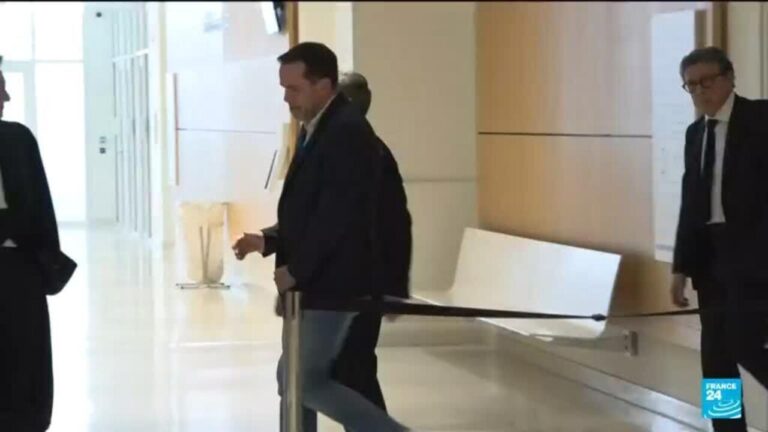In a significant development in the ongoing legal saga surrounding former French President Nicolas Sarkozy, prosecutors have called for a seven-year prison sentence in connection with allegations of corruption and illicit campaign financing related to his 2007 presidential bid. The prosecution’s request, made during a trial examining Sarkozy’s purported involvement in securing millions of euros in illicit funds from the libyan government, underscores the mounting legal challenges facing the ex-president, who has consistently denied any wrongdoing. As the case unfolds, it not only highlights issues of political accountability and integrity in France but also raises broader questions about the interplay between politics and international relations. This article delves into the details of the trial, the implications of the prosecutors’ demands, and the potential fallout for Sarkozy and the French political landscape.
French Prosecutors Make Case for Severe Penalties in Sarkozy’s Libya Trial
In a significant development during the high-profile trial of former French President Nicolas Sarkozy, prosecutors have called for a seven-year prison sentence, highlighting the alleged financial wrongdoings tied to his 2007 presidential campaign. Sarkozy stands accused of accepting €50 million in illegal campaign funds from Libya, a charge that has sent ripples through France’s political landscape. Prosecutors argue that imposing a severe penalty is essential not only for justice but also to reaffirm the rule of law in the country, underscoring the need for accountability, even for those in the highest offices of power.
The trial, which has captivated national attention, has unveiled a complex web of political finance and alleged corruption. Key points in the prosecutors’ argument include:
- Abuse of power: The prosecution claims that sarkozy exploited his position to secure illicit funding.
- Impact on democracy: They argue that such actions undermine electoral integrity and public trust.
- Precedent for future leaders: A strong sentence could deter future political figures from engaging in similar misconduct.
Moreover, the prosecution plans to present witnesses who will testify to the authenticity of documents purportedly linking Sarkozy with Libyan officials, further substantiating their case. As the trial unfolds, all eyes are on how France will respond to these allegations against one of its former leaders, and what implications a verdict could have for both Sarkozy and the broader political environment.
Allegations of Corruption: Key Insights into the Charges Against Sarkozy
The case against Nicolas Sarkozy revolves around serious allegations of corruption linked to Libya’s former leader Muammar Gaddafi. Prosecutors have presented evidence suggesting that Sarkozy received €50 million in illicit campaign financing during his accomplished bid for the presidency in 2007. This funding, they argue, contravened French electoral laws and represents a betrayal of public trust. Notably, the trial has unearthed a complex web of international relations and financial dealings, shedding light on the dubious methods allegedly employed to secure this funding.
key aspects of the prosecution’s case include:
- Financial records: Documentation that purportedly traces the route of the funds from Libya to Sarkozy’s campaign.
- Witness testimonies: Statements from individuals involved in the alleged money transfer schemes, some of whom claim to have witnessed direct exchanges.
- Political implications: The charges extend beyond Sarkozy, perhaps implicating other officials and raising questions about the integrity of French political systems.
| Allegation Type | detail |
|---|---|
| Campaign financing | Received illicit funds from Gaddafi |
| Corruption Charges | influencing public office for personal gain |
| Prosecutor’s Request | 7-year prison sentence |
The Political Ramifications of Sarkozy’s Trial on French Governance
The trial of Nicolas Sarkozy stems from allegations surrounding corrupt funding from Libya during his 2007 presidential campaign. This high-profile case is not merely a legal matter; it has significant implications for the current political landscape in France. The potential consequences of a conviction could dramatically alter public perception of political leadership and governance in France, particularly regarding the integrity of campaign financing. As the case unfolds, it offers a stark reminder of the longstanding issues related to transparency and accountability in French politics, raising questions about whether previous practices will change or if a culture of impunity remains entrenched.
Moreover, Sarkozy’s trial has reinvigorated discussions about the unity and direction of the French center-right, as his political legacy is put to the test. The reaction of political leaders across the spectrum will be crucial in shaping the narrative and might lead to divisions or a strengthening of alliances. While some may view this trial as an chance for reform,others may use it to rally support by portraying it as a politically motivated attack against a former president. The balance between justice and political maneuvering during this trial could set precedents for future governance, illustrating the fragility of trust in elected officials and institutions.
Public Opinion and the Future of Sarkozy’s Political legacy in France
The recent call for a seven-year prison sentence for former President Nicolas Sarkozy in the Libya corruption trial has reignited discussions about his enduring political legacy and public perception in France. while Sarkozy’s presidency (2007-2012) was marked by significant events and policies, his recent legal troubles have painted a contrasting picture, stirring both supporters and critics. The trial’s developments have led to a divided public opinion, with many taking to social media and polls to express their beliefs about his culpability. Controversially, supporters argue that he is being scapegoated for systemic issues, while opponents view the legal proceedings as a necessary reflection of accountability in politics.
Moving forward, Sarkozy’s legacy appears increasingly intertwined with perceptions of corruption and governance. Polls suggest that a significant portion of the population questions the ethical standards of politicians,influencing how future leaders will be judged. Key factors shaping this public sentiment include:
- Media Coverage: The extensive coverage of Sarkozy’s trial influences public viewpoint,often swaying opinion in favor of or against him.
- Ancient Context: Comparisons with past political scandals in France play a role in shaping views on current events.
- Future Leaders: The conduct of upcoming political figures will be scrutinized more intensely,guided by what has transpired in Sarkozy’s career.
The evolution of Sarkozy’s political legacy will largely depend on how these issues resonate with future generations of French citizens. As they navigate the complexities of trust in political institutions,the lessons drawn from Sarkozy’s case could have lasting implications for France’s political landscape.
final Thoughts
the legal proceedings surrounding former French president Nicolas Sarkozy’s alleged involvement in Libyan campaign financing have taken a significant turn with prosecutors seeking a seven-year prison sentence. As the trial unfolds, it underscores the complexities of political accountability and the shadows of past leadership decisions. This case not only shines a light on Sarkozy’s political legacy but also raises broader questions about the intersection of power,ethics,and the rule of law in France and beyond.As the court prepares to here both the defense and prosecution, the outcome will undoubtedly impact public perceptions and the future of political integrity in the nation.The coming weeks will be pivotal as the judiciary navigates this high-profile trial, with implications that extend well beyond the courtroom.




